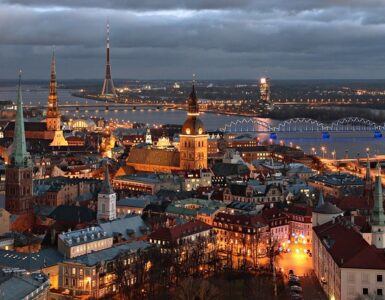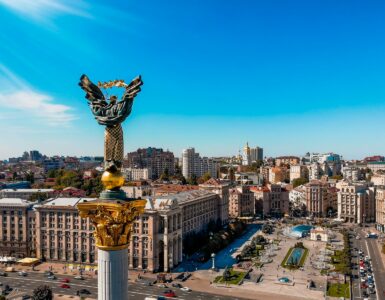SBER
Sber will use its own Linux-based operating system (OS) for its automatic teller machines (ATMs), thus becoming the first bank in Russia to quit foreign-made options. Through 2023, Sber’s OS will be installed on 90% of the bank’s ATMs. [Source: Sber]
Russia’s biggest bank Sber has established The Competency Center for IT Startups Intellectual Property Protection at its online venture hub SberUnity. Startups, residents of SberUnity, will get access to legal advice on patents, IP protection, personal data legislation and other issues. [Source: Sber]
Sber and the Far Eastern Federal University established The Far Eastern Artificial Intelligence Center at the university’s Mathematics and Computer Technologies Center. The new entity will be engaged in a wide range of tasks, including regulation of AI in Asia Pacific countries and cooperation with scientists from this region. [Source: The Far Eastern Federal University]
WEB3
Russia-born Canadian entrepreneur and blockchain innovator, the co-founder of the Ethereum Fund Vitalik Buterin paid a surprise visit to Ukraine for the first time as a sign of his support of the country’s efforts to counter Russian aggression. He attended the Kyiv Tech Summit and delivered a speech on Web3, Ethereum, and the future of blockchain in Ukraine. [Source: Incrypted]
The government of Yakutia, a region in the Russian North, rolled out a series of non-fungible tokens (NFT) for deer as part of efforts to implement digital technologies in deer farming. The buyer of an NFT will have one deer, to whom the buyer can give a name, and whom he can track through Global Positioning System (GPS). [Source: Kod Durova]
Russia’s oldest and biggest animation studio, Soyuzmultfilm, founded in 1936, will issue NFTs through partnerships with blockchain platform Polygon and IT company OD Business Technologies Group. There will be a few different tokens, including for digital art objects, exclusive rights, and for collections. [Source: TASS]
BIOMETRICS
Russian bank Dom.rf will offer the first ever biometrics-enabled mortgage loans. Clients who register themselves at a state-run web-portal and confirm their identities through a branch of Rostelecom will be able to apply for mortgage loans online. [Source: Dom.rf]
CYBERSECURITY
Russia only has 5,000 cybersecurity specialists, but the country needs 100,000, according to an analysis by Sber. Analysts noted an urgent demand for cybersecurity specialists, driven by an increase in the number of data leaks and hacked corporate information systems seen in Russia since the start of this year. [Source: Spark]
RISE OF ANALOGUES
Russian Internet giant VK reportedly asked the Russian government to allocate $50 million for the design of a Russian analogue to widely used foreign-made game engines Unity and Unreal Engine. Previously, Russian state corporation Rostech had come up with a similar initiative and it is now ready to team up with VK. [Source: Kommersant]
Russia’s Ministry of Digital Development launched a marketplace of Russia-made software. The marketplace, which is meant to ease the shift to domestic software amid an exodus of foreign suppliers, is now open to IT industry trade bodies only and will be opened to all users within a month. [Source: Spark]
Astra, a Russian IT company that’s designing a domestic operating system (OS), Astra Linux, to replace foreign-made OSs, got a bank loan at a discounted rate of 5% through an incentive program launched by the Russian government in 2019. $76 million will be spent on the design of the new OS and providing support for consumers in their transition to the Russian software. [Source: Vedomosti]
STARTUPS
LF.Group, a startup founded by Russian entrepreneurs and investors in 2021 in London as a platform for gamers looking for teammates, raised $1 million. Investments will help LF.Group hire more engineers and community managers and expand with an aim to increase the customer base from 50,000 gamers to 300,000. [Source: VentureBeat]
The Russian Post and Skolkovo Ventures founded a venture company to develop unmanned delivery systems to transport parcels and letters. Unmanned air vehicles will be predominantly used in remote, sparsely populated regions of the country. [Source: Interfax]
CIS
70 Centers For Civil And Digital Development were launched throughout Kyrgyzstan through a state-backed program to get citizens to develop technical skills. A few dozen centers will be added by 2023 in remote areas to facilitate the country’s digital transformation, Kyrgyzstan’s President Sadyr Zhaparov said. [Source: Sputnik.kg]
The Kazakhstan government is pushing for a fast certification of use of AI tools in medicine, as part of a state healthcare program that sees tele-medicine as a means to provide healthcare services for citizens in remote areas. [Source: Profit.kz]
Tajikistan will use television as a means to educate the population, primarily in math, technologies and engineering. As of September 2022, the channel Science And Nature started broadcasting 16 hours a day through a satellite network. [Source: Sputniknews.ru]
Share of e-commerce was 8.7% of the whole B2C segment in Kazakhstan during the first seven months of 2022, compared to 9.6% in 2021. The high percentage last year was caused by the COVID-19 pandemic that drove online sales, a factor whose impact decreased as COVID-related restrictions have been dropped. [Source: Kapital]The Azerbaijan government is considering offering benefits, including tax incentives, to entice more entrepreneurs from other countries to found their startups there. [Source: Trend]






Add comment